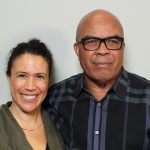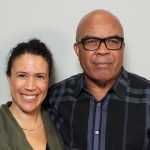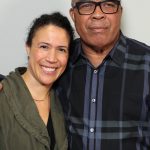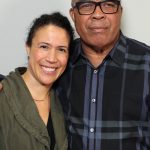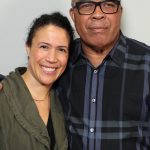Cleveland Harris and Tarana Mayes
Description
Tarana Mayes (44) interviews her father Cleveland "Chick" Harris (74) about his life, focusing on the role of sports and football in it, and about his being one of the first African-American coaches in the National Football League (NFL).Subject Log / Time Code
Participants
- Cleveland Harris
- Tarana Mayes
Recording Locations
Atlanta History CenterVenue / Recording Kit
Tier
Initiatives
Keywords
Subjects
Transcript
StoryCorps uses Google Cloud Speech-to-Text and Natural Language API to provide machine-generated transcripts. Transcripts have not been checked for accuracy and may contain errors. Learn more about our FAQs through our Help Center or do not hesitate to get in touch with us if you have any questions.
00:03 My name is Tyrone amazed. I am 44 years old today Tuesday, February 11th 2020 and I'm at storycorps Atlanta interviewing my father chick Harris.
00:19 My name is Cleveland chick Harris.
00:23 I made 74.
00:26 And. Today's date is Tuesday, February 11th on your birthday. I'm so happy to be with you.
00:39 Location storycorps story Corp, Atlanta
00:49 And my daughter's name to Ronna Lynn Harris.
00:55 May's Harris Maze, and I'm interviewing you today about your life and your career as an NFL football coach, but first I would make you for being here. I think it's really amazing all the places. Our careers is taking us that we live in the same city.
01:15 Yes, it's great to be able to be here with you seeing that professionally I've been away for quite some time and being able to rejoin you and your family is spin fantastic would happen if you were still living in Texas, so we're glad you chose Atlanta to come out good. So I wanted to just start by making sure for all of our family. They know a little bit about your life and how it started.
01:52 So, can you take me back to your growing up in Durham, North Carolina? Where were you born? And when was it like I was born September 1st 1945 in Durham North Carolina matter fact that Duke Hospital on the campus of Duke University.
02:15 And of tobacco driven town where that most employee employment was with the tobacco industry Grandma work at Duke University in the hospital of the family worked at Duke hospital at one time or another. Okay. And so you were born there to Grandma Shirley maiden name was
02:49 Shirley Sims Sims Sims and she was a single mother right and very young soul.
03:01 But she was quite a force and you had a village of people around you. So tell me about being raised by not just Grandma, but by all the aunts and grandmas and quite unique guy had a lot of ladies in my life and they were really hard-working dedicated people to get making sure that people live the right way and knew how to work and take care of themselves and to be self-sufficient this interesting. So it was mostly the women in our family who taught you those values. My father was a guess who's about
03:48 15 or 16 at the time they call him dag Harris and quite naturally young teenagers running around and getting to know their selves they found me and and I was in 1945. I popped up to tell me what it was like to grow up in Durham during those times. Durham was very interesting very interesting City. The things that I remember is just starting it was a tobacco industry town and it was
04:33 It was a segregated town and but people got along fairly well and and most everybody worked at one of the tobacco factories in Durham. I could have been Liggett miles. It could have been Lucky Strike and and and they were there all the time he could the interesting part of Durham Durham is at
05:07 About 80% of the black folks their work for one of the cigarette companies.
05:19 So tell me about the schools you went to what what what schools did you go to Growing Up. Do you remember their names? Sure, my first school was and I went to Burton elementary school in Durham, North Carolina, and I went from the first grade until the sixth grade after the sixth grade. I moved out to California where you met the cub scout leader the Boy Scout leader. That was so important to your life. Can you talk to me about him about it? It's mr. R Kelly Bryant. He was a boy scout leader of troop 187 and he had all the young man that that lived in that area in the Boy Scout Troop.
06:12 And he was a great force in our life. We got a lot of growing up with him experiences with him and the we taught us about life.
06:28 Work and the value of respect and there's a bridge named after him. Now. If you were a few in Durham today, you could go by the freeway there Highway 147. I think it is and there have a bridge that's blue at night for Russian blue at night and it's for mr. Bryant that you were in that troop with right over there at 7. Kind of with the times. We're so shoot in Durham that sometimes know there was no white friends. It was we all lived in the same area on the black side of town.
07:28 And the and that's what happened and that's everything was like the downtown area. Most everything was segregated your Vivid matte memories of growing up in the segregated South any stories that you can share the most people work for the cigarette companies factories there and they would get off of work at about 5, that was a big-time for the day shift to get off and all of the black folks that work. There was predominantly black workers a war these jumpsuits and they were white jumpsuits and they were you the from Lucky Strike or Chesterfield or whatever. The cigarette company was at the time and they would congregate
08:28 In a place call Five Points in Durham and they would catch the buses to go wherever they had to go home and the buses was segregated. So if there was any white people on the bus, they got the front row front seats and everybody else fell in line in the back and I just distinctly remember they are the buses having colored in the back and I was at I'm really glad that you got to share that with Marley on Martin Luther King Jr's birthday this this year. I choose really captivated by that story and I think it was so special that she got to hear it directly from someone her grandfather.
09:24 It was a time that it's quite Vivid In My Memory. All right now just to remember being on the bus going to the back.
09:37 Okay, if it starts to fill up you stood up or you waiting until the door closed and then you can move up to the one of the front row seats. Were you ever on the bus when someone maybe didn't do that or follow the rules? So to speak Sports will I eat? Well, I have found football in in in Durham. I used to go out to North Carolina Central University. And at the time was going North Carolina colleges all predominantly black University and I used to go on Saturdays because that was a big day for his football and I would go down there early and I would run around on the field when no one was looking and I would see this yard stripes.
10:37 On the field and it was great time on Saturdays when all the people would come to the games and was really big and and I would be on the outside looking in once the game starts at 10 and
10:56 They would be cheering and had all the bands playing and everybody wore their best and was a great social outing for the people at North Carolina Central and I remember North Carolina A&T playing that was one of the big games and and that happened to be played on November 20th 25th. And on Thanksgiving that was a big game and at the end of the game, I would walk out on the field, you know, after everybody would leave and I would walk and I would see the yard stripes and I've heard all this noise and fighting in a 2 to run the football or make a play.
11:41 And I went out there and Isis boy, they are there fighting for 5 yards 5 of yards would be easy to make and after a couple of concussions later in my college career. I found out five yards is kind of tough to make five yards is everything we'll talk more about that in a little bit. So so did you know then that football will be a part of your life.
12:08 Well, yeah, I think I think so.
12:13 That was an outlet on on the weekends during the fall and it was a glorious occasion all the college students going out to the game and they were all dressed more so than they are today. They were dressed up for the game and and the guys are in their uniforms and they would the band with play and it was just a fantastic setting to and I was something that I will always remember you moved to California. How old were you when you moved took the train to California, and why did you move to, California?
12:56 It was a 1957 think it was my mom had recently remarried and her husband Robert Womack Jr. Went out to Long Beach, California to work for the Veterans Administration Hospital. They are and my mom went with him.
13:23 Earlier, I stayed with my aunt for a year before moving moving there ever been around and she's always was teaching about saving your money hard work will get you someplace not being lazy will get you no place and I was just wonderful things. He was one of the greatest person in my life to her house. And her name is on the deed. That house herself, right? She bought the house herself and unbelievable story that he was a lady that I don't she never finished high school.
14:20 But she had jobs she knew how to work. She had a great work ethic and she knew how to save and she saved enough money to move into a Housing Development that I don't know how she got all the money for it, but she got the money and we moved in with her. My mom was she had me she was not married and my aunt took us in and we lived with her Aunt Clara is very special to me. I've developed quite a deep relationship with her and I really do believe listening to her stories is what made me want to become a storyteller.
15:08 Her stories are just unbelievable. She was sit down and tell us about you know, being in in the in the rural areas of South Carolina and talking about the hog killing time. Tobacco. The Pickin time all the uniform Stories the all the things that happened with the family in in that in that area and in time and her house is so much so many memories in it is Grandma still lives there today. 708 Bacon Street grew up and
15:52 It means so much to me and she took us in my Aunt Clara and brought us so that we had a place to stay and and so happened that the area that we lived in that was a new school is called Bird Elementary School and I was about six years old or so, and I was able to him.
16:21 That was my first school.
16:24 Well, then let's go to California and you took the train out there to California and then you became a west coast boy in 1957 was very very good year and in some respects and I was so sad to leave leave my friends and leave a place. I called home and the time that I had to
16:52 They had my mom went out with her husband my stepfather Robert Womack and they made a way for us. And then eventually she told my Aunt it was time to send me to her in Long Beach, California, so I had to take a train.
17:18 2 across the country to get there, but now I want to do that.
17:26 I had to have a tag on me as a youth traveling alone.
17:34 I just distinctly remember going to the train station.
17:40 Which was Jim Crow or it had a white side and it had a colored side and I remember vividly going into the train station in sitting on the colored side. And and that's that was the way of life, you know, you had your brown bag with a sandwich or some fried chicken or something to feed off of until you got to a destination where you could I go in to get find something to eat? So I left Durham in 1950.
18:21 7 +
18:25 And we went to first it was from Durham to Lynchburg, Virginia.
18:32 And then you we took another train from Lynchburg, Virginia to Chicago and that was a it was a very enlightening trip and I could I knew about Jim Crow I knew about segregation because quite naturally we're on the colored section of the train station and we sit in the color cars in the on the train and but once I got the Chicago we went through Lynchburg, Virginia to Chicago.
19:12 And I've read stories about in the north you are free. It was like it was no discrimination. No Jim Crow and I got there and I had time because I was leaving going to there was a connection that I had to make from Chicago to go to, California.
19:43 But I had time at the train station and I was hungry and I was very
19:51 Happy that.
19:54 I I knew it was an integrated situation that I could go any place in that train station in Chicago because it was at in the north and I could go and sit anyplace I wanted to because was not segregated. So sure enough. Here's a little 12 year old boy going to the restaurant that there was mostly predominately white people in the restaurant and they saw this little
20:24 Colored boy go through the door and go to the counter and I took a place there.
20:32 And and and they asked me what I wanted and I told him I wanted fried chicken that was on the menu and I thought that was would be the safest bet for me and sure enough. I got the fried chicken.
20:50 I tried to figure out what to do with it is my on it always talk to me about proper etiquette.
20:57 How to how to use your fork and spoon moving from now outside in and and I got confused and the chicken came and I was I didn't want to pick it up with my hands. So I decided that I would just tell them my train was about to leave and put it in a bag and I was able to take it to it might my train and I was able to eat it there. So I didn't embarrass anybody. I didn't embarrass myself. So that was the story of our it was really on that after that still went to hit California going to get to football but did it feel instantly different being on the west coast, which is where I grew up in Seattle where a family was raised. We were became when you became a westcoaster for many years. So what was instantly different for for you as a black the young black boy there?
22:00 I went it was entirely well as different. I think there was there was mixtures of people in different different parts of the community all over the place that I lived. It was it was predominantly black but that you would have different other races that was close close by and we will you develop friendships.
22:26 So getting into the getting of the 60s really quick tell me when you started to be aware of the civil rights movement in terms of protests and
22:38 You know marches and riots even very very good experience or it taught me a lot. There was a lot of folks in Long Beach California that came from other places the South put on my way. And because there were a lot of jobs in California from the Inn Long Beach. They had the shipping industry the longshoremen. We had a lot of things a lot of lot of jobs that people could get into and especially people of color have had extra chance to to do something and the and the jobs played pretty good grandma work.
23:36 In Long Beach domestic. She worked for a doctor a couple of doctors send to make sure that she was clean their house and and it was it was a good good job for her and and that's how she made is he had a couple people that you just work for the most of the time so that that was her job right there. She was to take care of and help help them. Take care of the home. When did Sports become so Central to your life? Was it tracker football first? They was that at Long Beach Poly or that was all through college high school started in junior high school or when I first came to Long Beach.
24:35 I
24:37 What's going into junior high or middle school? The 7th grade is Franklin junior high school and Franklin was a it was a good mix. It was a mixture, but probably a little bit more people of color in that school then and some of the other schools. Okay, but it was good. It was Amex. It was integrated all the schools that I had been and was color white. That's what it was segregated. So once I got there, I found out that Franklin Junior High School
25:20 Was one of the top junior high schools in sports
25:26 So all these only people all at all the students there. They were pretty good at sports and I went out for tracking all went out for football and also they found out when I went out for football that I can run pretty good to matter fact. I was better than some of those guys and then we will play football and play I would be instrumental in some of the games in the sum of the Winds and maybe some of the loss of stupid, you know, I was able to play I was a first-teamer in football and then we went to track now track was a big Sport and so happens that
26:16 We had some people that went on to to to compete you the one on on the call Collegiate level and from from Franklin Franklin. Okay, they moved to Long Beach Poly. That's the high school and salon Franklin. I met a young lady by the name of Martha Watson.
26:40 And she was a long jumper.
26:43 And we got to be friends and I would ask her about long jumping and she would tell me about it. And then she was on the track to so she would run track to choose run the spreads so started that relationship and to make a long story short is that we went on through the three years at Franklin and we had some good track teams and some good football teams. And I also played football outside of Franklin play on in the community League tackle football, and that was a nice outlet for me.
27:27 Until you went on scholarship to Northern Arizona University. Yes, I did but I'm still at Franklinton High School right now trying to get to the football start of Franklin junior high school and then graduated well graduated from Franklin from the 9th grade to the 10th grade. I moved to high school senior high school and that's when I got involved in football.
28:09 And football was
28:12 You didn't know it then but that would become year per your profession. Always had it started when I was in Durham, North Carolina watching North Carolina Central play and then watching the Washington Redskins play on Sundays because that's the only game or team that we had a chance to see on TV with the Washington Redskins down south. That was the team and I got all fired up about that but getting back to can I ask a question with the Washington Redskins really quick. So the Washington Redskins when you were watching those games, did you any ever seen any black coaches on the sidelines? Absolutely not. It was a predominantly white Team all together with very few.
29:09 Black I don't think blacks came to that team until
29:13 In the 60s mid-60s players about coaches, you know, when did the first black coach who was Fritz Pollard the first black NFL coach and so I was trying to understand your you became an NFL football coach in 1981. I was trying to understand because you spoke about the Redskins and today the Washington Redskins announce that they hired the first black female coaching intern and there's like Collective like six women in the NFL. I just wonder how it feels having watched from watching on the couch as a young boy when there was no black coaches or players for that matter to you becoming one of the few black coaches in the NFL in 1981. How many black coaches were there? Do you know?
30:13 Vaguely when you became a coach or think was about
30:21 Maybe about eight of us at the at the I think about eight of us. We've progressed all the way to the Washington Redskins hiring a woman a black woman today to put that in perspective of your life.
30:43 Can you tell me what how that how that
30:49 Yeah when I was in, North Carolina.
30:55 The Washington Redskins only protein
31:01 That was our home team.
31:04 So if you wanted to watch football.
31:07 You would watch the Washington Redskins play against whoever but that's the only thing that came on TV in the south.
31:17 Okay, and is Hail to the Redskins the whole shot and their team was predominantly white until
31:27 Into mid-sixties, I guess it was.
31:32 I just want to ask so I'm 44 today at 8:44.
31:41 That was 1989 for you. You were 4499 and you were a physician coach of the Seattle Seahawks fortunate to begin your pro while you went from the Buffalo Bills to the Seattle Seahawks in the NFL that we got to go back to start your pro career where I was born in Seattle. So can you talk a little bit about your time at the Seahawks? And first of all that that hold the time from 1983.
32:22 Until
32:25 What are those? What do we say from 19 a 1983 to 19?
32:38 Missy
32:40 Anyway, it's okay. Let me let me let me let me eat you. You've coached some very prolific running back in your NFL career you I think it one time I read had eight NFL running backs who broke 1000 yards season over 15 times you coached numerous pro bowlers and All-Pro players at the some of them at the same time on the same team.
33:08 Jerome Bettis the same to you in his Hall of Fame. Speech. What do you think? And you had 35 years right in the NFL. So what do you attribute to your success in that very competitive industry Durham, North Carolina looking at North Carolina Central play and having this vision of what I thought I felt that success would be like thought that there was a Avenue for successful for for Success being able to go to school college that way and get in the college football then going on to coach.
34:03 And after I got out of college, I started as a graduate assistant and I moved on up the ranks through from Colorado State University in 1977. 71 Colorado State University in Fort Collins. And then with that California to Long Beach for a bit and had a chance in Long Beach salsa, no friend of mine that I was a coach coach of mine when I was at Northern Arizona call me and said hey you want to be in pro football?
34:43 I'm going to a team that's going to be in Detroit. It's a new league. It's called A World football league and they will be call the Detroit Wheels and I can get you a job with me. You could be with me and I can show you the ropes and you'll is pro football and then be on your resume, so.
35:07 You want to go and I got all fired up and went to Detroit is that Detroit was a teen?
35:22 1980
35:31 80
35:33 I can't tell you right off.
35:36 Thank you. Just tell me tell me in your own words would probably didn't feel like you were making change at the time, but you were opening doors because you are one of a handful of black coaches in the NFL in the 80s. And now we're still talking all these years later about there not being any head black coaches very few. Anyway, I just I just wondered
36:03 What you did personally to help open doors for other black coaches in the NFL.
36:10 What I tried to do is do the best job I could as a position coach and I was very lucky to have some great mentors great head coaches. It gave me a chance to start Andy McDonald was my head coach of Northern Arizona. He got me the job at Colorado State University my first job
36:39 And then from there I went to
36:42 Long Beach State in Long Beach, California junior college coach that had got me ready so that I could go to a 4-year school, but he had a job for me.
37:04 And I was one of the captains at one time. So therefore he wanted me to be on on that staff and I was able to get their relationship relationship is great and I had farther like people in positions.
37:23 My head my head coaches really helped me all the way through and maybe I was I was a hustler and I tried to do the best I could as a football player and I was the team player clearly you had all these strong women who taught you lots of those my mom and my grandmother and they were beating it into me that you've got to work and you've got to earn a living. So what are things I know that you did was that in the early 2000s you went with a delegation of black coaches to talk to the NFL about making more opportunities for coaches of color Yes.
38:12 I remember being very proud of that because I was at ABC News at the time and all the news outlets are covering that because the black coaches were standing up to say give us an opportunity and you were right there at the table was 1995. I think it was and Rihanna. Well, well it started there and 90's 95-96. We're all of a sudden there was a lot of there was jobs open.
38:49 And no by coaches got a job.
38:53 Okay, and they weren't even considered for a head coaching job. Okay. So there was I think about 13 of us that decided that we were going to go to the league office and talk to the commissioner about that and I talked to Jerry Richardson. That was the owner of the Carolina Panthers as 1995 which he was very supportive of me all all the way through and he said if you want to go up there I go right ahead. You know, you have my blessing and I went up in and I was with all the guys are that came from other teams, and we talked to the commission was Tiger Boo at the time.
39:44 And we talked about we were we were in New York.
39:51 To try to help the NFL.
39:55 With the situation with
39:59 Trying to get head coaches black coaches an opportunity to apply for to be a head coach and we were there we had to have a mission statement the night before so now we've got to really do this thing, right?
40:17 We have to have a mission statement.
40:20 Saying we are here to help the NFL not to hurt the NFL.
40:25 We want the help.
40:27 So that we would not be in a position that we could lose our jobs or get bad press for are the teams that we work for so we did it at that and you did make change because eventually in 2003 the league adopted the Rooney Rule which made it
40:50 Well, which is requested required all teams to have a a slate that included coaches of color.
41:01 That was quite a move there to be able to at least Advanced are our chances to to get a place at the at the table to see if we could get in the position to be a head coach.
41:21 Well, you're our lives are football life growing up. Your life. Our lives are dominated by Sunday games and cycles. And I just was so proud of you when I learned of that news and started studying the history of black coaches in the NFL because I just know how much you put into the game and how much it took away from our family because you were working so hard and it hurt me to know that maybe you might not have all the opportunities because
41:58 Do you wear black? I don't know but I think you had an amazing career, but I still saw that you probably made some sacrifices along the way of making a life for your family and I just want to say thank you because it showed me the value of hard work and I think even though I never wanted to be a football coach. I think when I found my own career that was its own challenging industry and competitive industry and television production that I knew how to conduct myself because I've watched you all those years. So I want to say thank you very much appreciate it and I am so proud of you as far as been able to attend Stanford University and go on to be in the media business.
42:48 Well, thanks for being here. I wish I think there's more to come on this.


